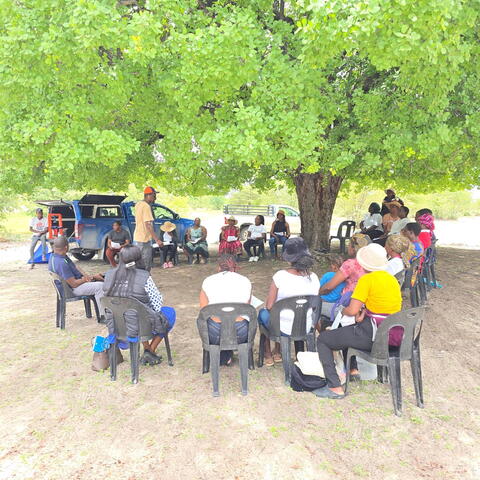Pressing ahead to improve melon oil extraction & save subsistence farmers time & energy

As a perennial and drought-resistant plant that is indigenous to the region, the Kalahari melon is an effective and ancient cover crop for traditional grain/sorghum/maize crops and will play a key role for food security in the era of climate change.
Using funds provided by the ACES International Graduate Grant, I initiated a study about Kalahari melon oil extraction in Namibia.
Kalahari melon oil has many uses—it can be used for massages, in hair products, as cooking oil, and even medicinally. I was surprised to learn there's no waste produced from the Kalahari melon oil extraction; the leftover cake is not only edible but also serves as nutritious animal feed. This sustainable approach maximizes every part of the melon, ensuring nothing goes to waste according to the community.
The aims of my project were 1) to document traditional methods of Kalahari melon oil extraction among subsistence women farmers from the Omunyekadi village in northern Namibia and 2) to assess interest in an innovation developed here at the University of Illinois Urbana-Champaign that could improve processing of oil extraction by saving time and energy saving while reducing deforestation.
Meeting the community & introducing the oil press

We started our meeting in the traditional way for this area, which was with a prayer, creating a warm and welcoming atmosphere for our gathering. The event also drew some special guests, including the councilor of Ondobe Constituency, a senior technician from the Ministry of Agriculture, and a member of the traditional authority. Their presence highlighted the significance of our project and the community's collaborative effort toward sustainable development.
Also attending were over 30 local, motivated women in Omunyekadi. Many of these women have been extracting Kalahari melon oil using traditional methods for generations while others wanted to learn how to make oil. The community members shared their traditional oil-making techniques. We discussed and asked questions freely.
The equipment I introduced was designed from scrap materials that can be easily found in local community areas such as from scrap cars. This design is simple, so you don’t need to have much training to make it. The machine is easy to use, durable, and easy to maintain, and one can operate the equipment without extensive training. One of its key advantages is that it does not require electricity to work, though there's potential to add a motor in the future if electricity or solar power becomes available to the community. Also, the equipment is not limited to Kalahari melon seeds only, it works with other seeds such as Marula nuts etc.
I demonstrated how the equipment works, and then community members tried it out for themselves.
The feedback was incredibly positive, and they were excited about how much time and effort the machine could save them compared to their traditional methods. Seeing their enthusiasm was truly rewarding. It was encouraging to see their willingness to embrace this new technology while still preserving their traditional ways.
Many of the women talked with passion about how important Kalahari melon oil is, not just for use at home but also to make money. This innovation could help empower women and youth toward employment and fighting poverty.
Handover of the oil press
At the conclusion of my trainings, I officially gifted the oil press to the Office of the Councilor of Ondobe constituency while the community sets up their own oil press business. Once the community has finished registering their company, the councilor will then pass the oil press on to them. This ensures that the press will be used to benefit the entire community as they move forward with a new business.
I look forward to returning soon to see how the innovation has been adopted and to refine the equipment based on the community's feedback.
Acknowledgment
I would like to share my sincere appreciation to the ACES International Graduate Grant program and the guidance of Professor Ann Witmer, whose pioneering techniques in contextual engineering provided a strong framework for community engagement. This project goes beyond introducing new technology; it's about empowering people, preserving traditions, and making sustainable improvements.
A heartfelt thanks to everyone involved, from local community members to authorities, for making this trip possible. Together, we are building a future where tradition and innovation go hand in hand as a way of applying contextual engineering approach.
Jason Kandume is a graduate student and a visiting research specialist in agricultural & biological engineering.
The ACES International Graduate Grants are intended to fund international activities undertaken by Graduate Students in the College of ACES. Applicants may request funds of up to $4,000 per proposal to support international research opportunities. These awards have been made possible through generous donors.